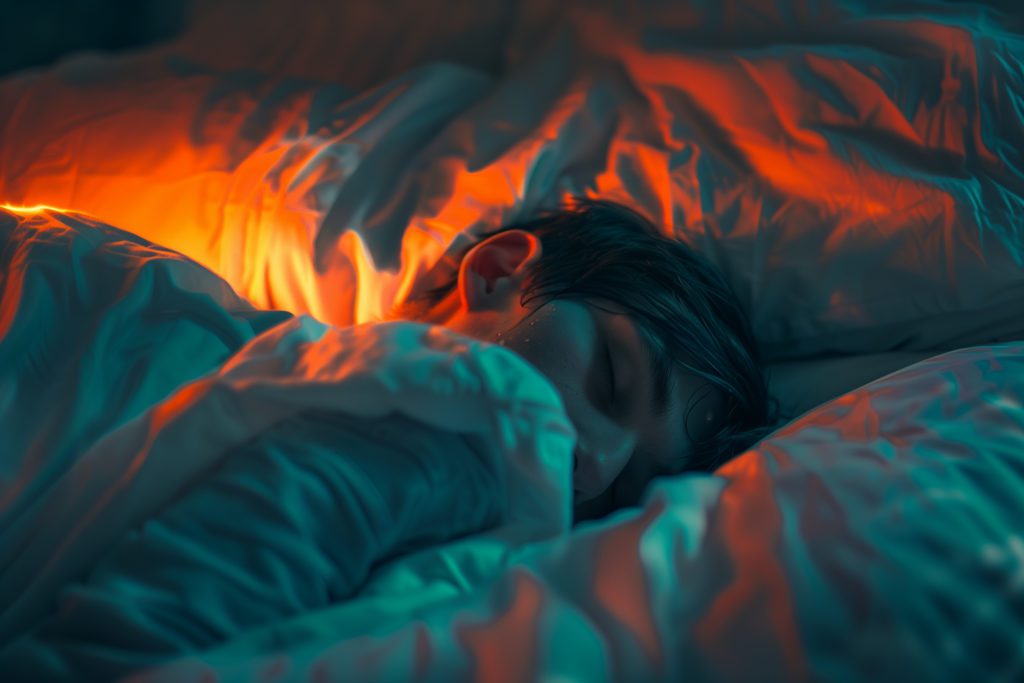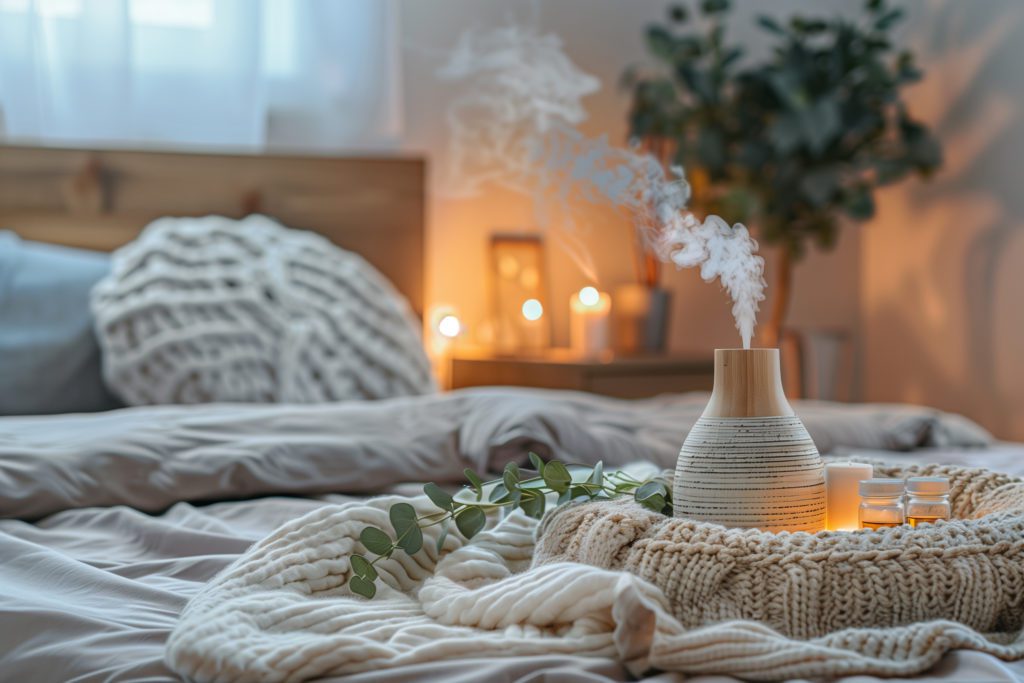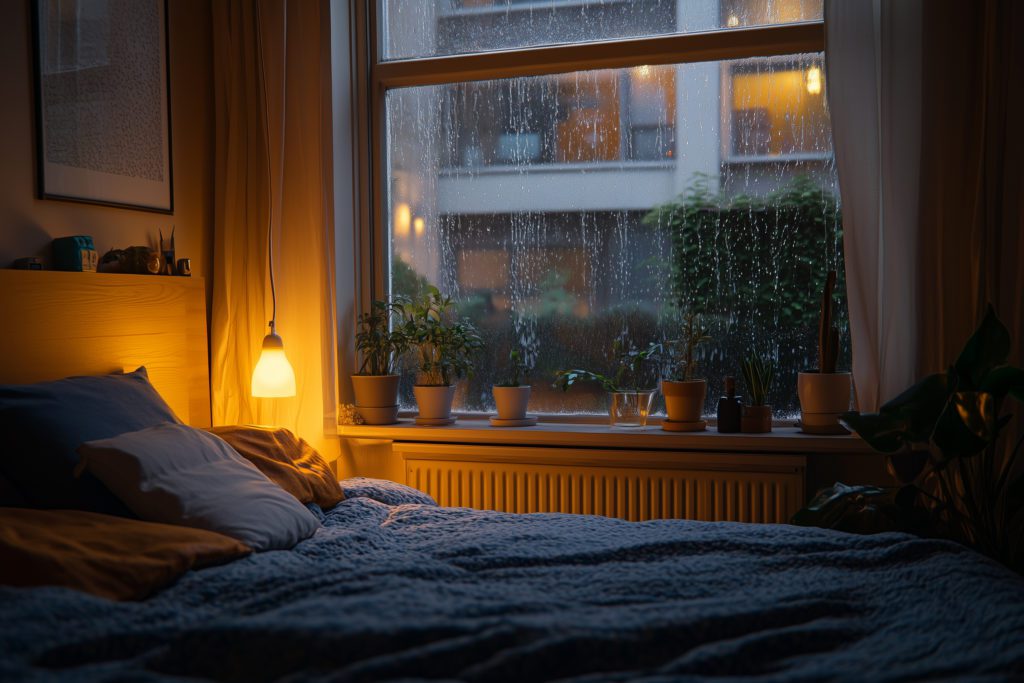
Natural Remedies to Reduce Sweating During Sleep
Explore possible causes of nighttime sweating and remedies for each, along with generic suggestions for cooling yourself down at night.

Do you sweat during the night and wake up covered in it? It’s not only unpleasant, but your body’s increased temperature can be uncomfortable, making sleep hard to come by. Even worse is that the more you toss and turn because you can’t sleep, the more you’ll sweat, furthering your predicament.
Besides a hot bedroom, there are many possible causes of nighttime sweating, some involving hormonal changes and others resulting from personal events happening in your life. Many of these conditions can be addressed without medication, though, using natural and home remedies to reduce sweating; it’s often simpler than you think to find relief.
We’ve compiled some common causes of nighttime sweating, how to remedy each, and suggestions that work for everyone in case you don’t know what’s causing your hot flashes.
What Can Cause Night Sweats?
If your bedroom temperature is warm or you have on too many layers as you sleep, it’s normal to sweat a little. However, if you wake up drenched in sweat regularly, it’s likely from another cause.
Let’s take a look at what may cause night sweats and some natural remedies for each condition.
Menopause
Hot flashes are characteristic of menopausal women for a reason, and even in sleep, you’re not safe.
When women go through menopause, their estrogen levels significantly decline, which can cause several symptoms, one of which is hot flashes. At night, this may mean that you feel too hot to sleep or wake up sweating.
The Remedy:
A quick remedy for menopause hot flashes is to keep a fan nearby to keep you cool. Additionally, avoid alcohol, which can further heat your body. By avoiding it, you may be able to reduce hot flashes and night sweats.
It may seem counterintuitive, but getting active can also help reduce hot flashes, with a study finding that menopausal women who took part in a 16-week exercise program experienced fewer hot flashes than women who did not complete the program. As for what workouts may be best, HIIT workouts raise your body temperature, teaching your body to better handle sudden increases, while strength training three times a week has been shown to decrease hot flashes by 50%.
Fevers
A fever occurs when your body raises its internal temperature to try and fight infection, but this can leave you sweating, especially if your fever breaks during the night.
The Remedy:
If you have a fever, drinking more fluids can help keep up your internal fluid levels, which may cool your body, especially if you drink chilled fluids. If you’re worried about dehydration because you don’t have an appetite or have been vomiting, a sports drink can be a good choice to replenish electrolytes while upping your fluids.
Another option is to take a lukewarm bath, not a hot one, before bed. It can help reduce a fever and may even make it easier to fall asleep. Once the water starts to cool, though, it’s time to get out of the tub. A cold bath may seem refreshing if you’re hot, but it can cause you to shiver, raising your body temperature even more.
Otherwise, the best thing you can do if you have an infection and fever is to rest, as this allows your body’s immune system to be more productive. The good news is that once the infection runs its course, your fever should go away, and the night sweats will stop. If your symptoms do not improve after a few days, though, you may need to see a doctor for medication to treat the infection.
Anxiety
Anxiety is commonly known to cause sweating during the day, and while night sweats can occur in those with anxiety, the reason why is less understood. However, it may be because anxiety can increase the risk of sleep disorders or nightmares, which can then cause nighttime sweating.
The Remedy:
In this situation, reducing anxiety is the key to stopping night sweats, and there are many ways to accomplish this, including:
- Trying mindful breathing or other meditative practices, which can reduce your hot flashes and help you be less bothered by them.
- Engaging in daily physical activity
- Seeking support from friends and family
- Avoiding excessive caffeine and alcohol
Alcohol and Caffeine
Both alcohol and caffeine can make you feel warmer.
Alcohol does this by dilating your blood vessels, causing more blood to flow and making your skin feel warmer. However, this widening of the blood vessels is how the body cools down, so while you may feel warm and start sweating, your body is actually cool. So, if you drink alcohol, try to regulate your warmth, but don’t put yourself in any situation where you might experience hypothermia.
Hot flashes can also accompany hangovers, so it’s not only right after drinking that you can feel increasingly warm; it may hit the day after, too.
Caffeine can also cause sweating. Caffeine is a stimulant that increases alertness but can also stimulate our metabolism and raise our body’s core temperature.
The Remedy:
The remedy is clear for both beverages: don’t drink them too close to bedtime. For alcohol, avoid overindulging, as well, to reduce the likelihood of a hangover.
Other Ways to Stay Cool at Night
Besides addressing the above possible causes of nighttime sweating, there are also things you can do to make your sleeping space cooler, which can further prevent your body temperature from rising to uncomfortable levels.
- Change your bedding. If your sheets hold onto heat and you find yourself kicking them off, try light cotton sheets or—even better—sheets, pillows, and comforters that say they’re temperature-regulating.
- Use a cold compress. If you’re feeling warm before bed or wake up hot, try using a cold compress to bring your temperature back down. Placing it on the neck, armpits, or torso can be the quickest way to cool yourself, but wrap the compress in a towel or other fabric first to keep it from pressing directly against your skin.
- Cool your room. If it’s cold outside, open up your windows to help lower the temperature in your room, or if it’s summer, lower the thermostat at night and use a fan to keep up airflow.
- Wear lighter pajamas. If you go to bed in a long-sleeved shirt and pants each night, it may be time to rethink your pajamas. Opt instead for pajamas with light, loose fabrics.
When to See a Doctor About Nighttime Sweating
If you’re sweating at night, you can often manage through natural and home remedies such as cooling your sleep environment, opting for lighter pajamas, and avoiding temperature-raising beverages too close to bedtime. Additionally, strategic cold compress placement, mindful meditation to reduce anxiety, and getting exercise during the day can help manage some possible causes of night sweats.
However, there are other possible causes of night sweating, such as medication side effects, cancer treatments, and hyperthyroidism. For these conditions, talking to your doctor about adjusting your medication, especially if your nighttime sweating makes you too uncomfortable to sleep, is a good choice.
In most cases, though, you can manage your nighttime sweating by optimizing your sleep environment and habits. Check out Pillow’s resource library for more tips on improving your sleep.
FAQ
Could my menopause be causing me to sweat at night?
Yes, night sweats are a common symptom of menopause, mainly due to lower estrogen levels. Keeping cool with a fan or even exercising might help reduce those sweats.
How can I stop sweating at night without using medication?
You can try several natural methods, such as adjusting your bedroom temperature, using lighter bedding, wearing loose, breathable clothing, and practicing relaxation techniques to reduce stress. Staying hydrated and avoiding alcohol or caffeine before bed can also help manage night sweats.
Can coffee cause sweating at night?
Yes, caffeine is a stimulant that can increase your metabolism and raise your core body temperature, which may lead to sweating. It’s best to avoid consuming coffee or other caffeinated beverages too close to bedtime to prevent this from happening.
Is it normal to sweat after drinking alcohol at night?
Yes, it’s normal for alcohol to cause sweating, especially during the night. Alcohol can make you feel warmer by dilating blood vessels, which leads to increased blood flow to the skin, causing a sensation of warmth and potentially triggering sweating. If you’re experiencing night sweats after drinking alcohol, it’s likely due to this effect on your body.
Why do I sweat so much at night, even if my room is cool?
Sweating at night, even in a cool room, can be caused by factors like hormonal changes, anxiety, or certain medical conditions. It could also be due to your body’s natural temperature regulation process or other underlying issues like stress or medication side effects. If it’s persistent, consider speaking with a healthcare professional to pinpoint the cause.

Written by
Jessica G
Medical writer freelancer who has written hundreds of articles on varying topics. Masters of Engineering degree in Biomedical Engineering.
Download Pillow
Get help
Press & News
Legal
Connect
X (Twitter)
Company
Copyright © Neybox Digital Ltd.



